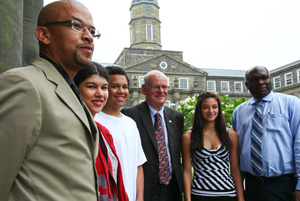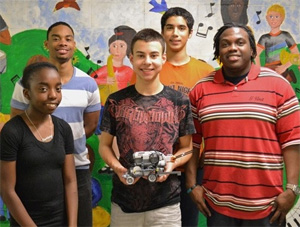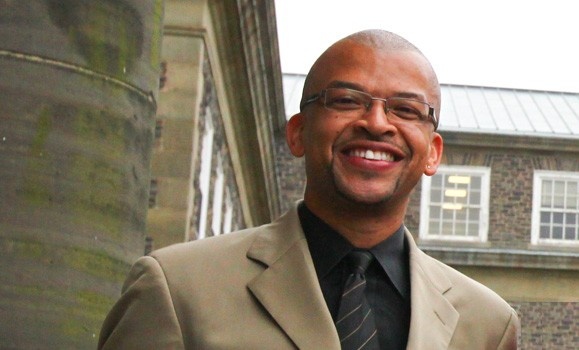For the past 10 years, Kevin Hewitt has been helping provide African Nova Scotian students from grade seven onwards with the hope, inspiration and resources to believe in themselves and their futures.
Now, itвҖҷs time for him to take a step back and let others continue this important work.
The Imhotep's Legacy Academy began as an after school program, led by a volunteer board of directors from the university and community. It promotes the educational, social, and personal development of young African Nova Scotian learners (grades seven, eight and nine) by engaging them in STEM (science, technology, engineering and mathematics) enrichment activities with a vision to improve on the representation of African Canadian professionals in the various fields of science.
вҖңWe pair mentors who are of African decent with students and deliver fun interactive science activities within the schools every week for about two hours,вҖқ he explains. вҖңOn alternate weeks they give math enrichment and homework help.вҖқ
Lifelong inspiration
The approach is a very personal one: a ratio of one mentor to five students. There are five different sites throughout the province: Caledonia Junior High and Oxford Junior High in HRM, St. Andrew Junior High and John Hugh Gillis High in Antigonish, and Whitney Pier Memorial Junior High in Sydney. В
Dr. Hewitt emphasizes that itвҖҷs quantity and quality of interaction that makes Imhotep effective вҖ” getting students to build relationships with mentors who demonstrate the possibilities of science.
вҖңA lot of groups are interested in spending a week with a thousand students. Our approach is to spend a thousand hours with a few students to really help them. You canвҖҷt just intervene at one point and think that everything is going to be fixed. ItвҖҷs slow arduous process, but itвҖҷs the most effective way to make an impact.вҖқ
A few years ago, Imhotep started a virtual tutoring program. Students log on from across the province to get homework help and connect to post-secondary student mentors at computers in the Killam Library.
вҖңWe found there were students who wanted to be tutored face-to-face, so we have weekly sessions for that,вҖқ Hewitt says. вҖңWe also provide additional science enrichment through tours to local business that employ scientists and use science. For example, one of the activities we have is making plastics from milk. The group in Truro went to Scotsburn. These additional programs provide even more exposure to science.вҖқ
This year, students were involved in the first Lego League competition, and Imhotep also partners with local science education organization SuperNova.
A look back
The program was born out of a one-day workshop Dr. Hewitt prepared in Vancouver for students from kindergarten all the way to grade 12.
вҖңWhat motivated me was my own interest in demonstratingвҖҰ [I thought about how IвҖҷd] present physics principles to my own kids. I knew that if I were standing up there lecturing theyвҖҷd tune out right away. It shouldnвҖҷt just be an abstract thing on the board; they should be able to relate to it.вҖқ
 Dr. Hewitt (left, joined by Scott Mullin of TD Bank Group, Pemberton Cyrus and the first recipients of the TD Bank Opportunity Scholarships through Imhotep) explains that when he came to Nova Scotia he noticed the large African Nova Scotian population and wanted to connect with people in the community. He immediately became involved in a summer science camp that was organized by the council of African Canadian education, through which he met his collaborator Wyan Hamilton.
Dr. Hewitt (left, joined by Scott Mullin of TD Bank Group, Pemberton Cyrus and the first recipients of the TD Bank Opportunity Scholarships through Imhotep) explains that when he came to Nova Scotia he noticed the large African Nova Scotian population and wanted to connect with people in the community. He immediately became involved in a summer science camp that was organized by the council of African Canadian education, through which he met his collaborator Wyan Hamilton.
Wyan contacted Barb Hamilton, DalвҖҷs Black Student Advisor at the time, and together they launched a one-week summer camp where students were drawn from different schools to come to campus. Patrick Kakembo of the African Canadian Servcies Division provided support to help get it off the ground, and has increased support since then. By the fall, they settled on the after-school program.
вҖңThe high school tutoring and all the programs for post secondary are all recent вҖ” within the last couple years,вҖқ says Dr. Hewitt. вҖңWeвҖҷve slowly amped up over the last few years, but weвҖҷve really hit our peak over the last two years.вҖқ
He notes that all of the Imhotep board members are volunteers. вҖңWeвҖҷre all trying to give of ourselves, because we have all been apart of the community. We have benefited from others [and to me itвҖҷs about] giving back what we have been privileged to have.вҖқ
When asked about the programвҖҷs biggest accomplishments, Dr. Hewitt speaks of the unbreakable bonds that are created between students and teachers of all ages.
вҖңIn our closing ceremony we celebrate the students participation,вҖқ he says. вҖңInevitably, IвҖҷm in tears because the students who are participating form such a strong bond with their mentors that continues beyond the program. And those relationships help them overcome the barriers that they are faced with. I remember one student in particular wrote a poem to her mentor entitled вҖҳBefore You.вҖҷ Each year there is just more of that thanks that you hear from the students.вҖқ
Moving on
This year Hewitt is stepping down as president of the program after 10 years. He said that the results of the robot competition вҖ” particularly that the Oxford School First Lego League team won вҖңbest technical presentation" (below, left) вҖ” that made him feel there was tangible evidence of the programвҖҷs success.
 вҖңIt exemplified all of the things weвҖҷd been saying qualitatively,вҖқ he says.
вҖңIt exemplified all of the things weвҖҷd been saying qualitatively,вҖқ he says.
Dr. Hewitt likes to think of the age-old saying that it takes a village to raise a child; itвҖҷs a mantra that he puts into action with this program. "If I was born in this environment, maybe I too would have thought that I couldnвҖҷt achieve certain things. I grew up in the Caribbean where the teachers, politicians and scientists all looked like me so I didnвҖҷt have any thought in my mind that I couldnвҖҷt achieve whatever I set out to do.вҖқ For this reason, Dr. Hewitt knew that he wanted to give back and provide students with that support system, and instill encouragement and a safe environment to thrive in.
Even though Dr. Hewitt is no longer going to be president of the program doesnвҖҷt mean that heвҖҷs saying goodbye to it entirely, of course, or to his role as a community leader.
He speaks of a serendipitous moment that occurred when watching a presentation given by the brother of Keith Taylor, former dean of science and currently associate vice-president academic. Dr. TaylorвҖҷs brother has been involved in a program for grade four students in St. Vincent where Dr. Hewitt grew up.
"[During the slideshow] one of the pictures was of my old school. I looked at them and thought, вҖҳI was one of them,вҖҷ and if it were not for the fact that my mom was able to bring us to Canada I wouldnвҖҷt have the opportunity that I have to be here.вҖқ
It is HewittвҖҷs hope to travel in September to his hometown to speak with the Department of Education to create something similar to Imhotep within the school system.
Imhotep partners with many stakeholders, including the African Canadian Services Division (ACSD) - NS Dept of Education, TD Bank, Encana Corporation; Office of African Nova Scotian affairs, Council on African Canadian Education; В鶹ҙ«ГҪ through the President's Office, VP Student Services, Physics and Atmospheric Science, Faculties of Science, Engineering, Medicine and Agriculture; St. FX; CBU; administrators at partner junior high and high schools, SuperNova.

